This piece was originally published in the January 15, 2021 edition of CAP Action’s weekly newsletter, What’s Trending? Subscribe to What’s Trending? here.
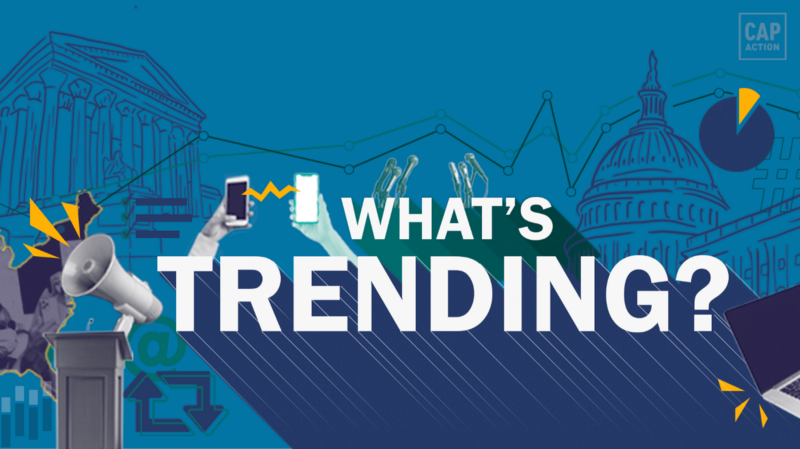
Hey, y’all.
I want to begin this week’s newsletter by saying I hope you are all safe and well. The last week has been downright scary. Instead of preparing for the inauguration and celebrating historic wins in Georgia, many of us will be spending the weekend hunkering down to avoid hordes of white supremacist insurrectionists seeking to commit acts of violence in our communities. I’m preparing by stocking up on my favorite snacks and picking up a few new books, in addition to taking a few common-sense emergency preparedness steps.
This week’s newsletter is a little delayed due to last week’s insurrection — we wanted to take more time to analyze the massive effects of Trump’s deplatforming. That’s what we’ll dig in on this week. But first, did you miss the last edition of What’s Trending? Don’t worry — you can read it here.
WHAT’S TRENDING THIS WEEK
- Runoff elections for Georgia’s two senators officially put Democrats in control of both chambers of Congress and the White House for the first time since 2011. Ousting Senators Kelly Loeffler and David Perdue, Reverend Raphael Warnock and Jon Ossoff are expected to assume their roles by the end of January.
- On Wednesday, months of GOP and right-wing lies about the results of November election boiled over into a violent insurrection at the United States Capitol — led by pro-Trump white supremacists chanting “our president wants us here!” The chaos led to at least five people dead with many more injured, and we are only just beginning to understand exactly what occurred that day. With blame overwhelmingly at his feet, Trump has been largely deplatformed from social media in the final days of his presidency.
- On Wednesday, the House again voted to impeach Trump for inciting insurrection in a 232–197 vote, the biggest bipartisan majority in history, with 10 Republicans voting in favor of the resolution. He is the only United States president to be impeached twice, with the resolution heading to the Senate for a trial to convict or acquit.
WHAT WE’RE HEARING ON SOCIAL
It’s been a wild 10 days on social media, so let’s recap, shall we?
- First, Trump and his cronies incited a white supremacist insurrection at the United States Capitol and throughout D.C. — planned largely on social media.
- Then, a myriad of tech companies, including Facebook and Twitter, banned or suspended Trump from their platforms.
- Now, right-wing rioters are threatening more violence during next week’s inauguration.
I want to be super clear: While I’m sad it took a literal insurrection to make social platforms see the light, deplatforming Trump, especially from widely-used social media platforms like Facebook and Twitter, is a really important step. That said, we need structural change in order to permanently address the problem of disinformation.
Our sister 501(c)3 organization, the Center for American Progress, has some great suggestions including building shutoff switches for product features that may contribute to violence, building viral circuit breakers, removing posts that baselessly delegitimize election results. It’s easy to feel helpless, but remember: this is a problem we can solve.
So what were the results of Trump’s suspension from major social platforms? Let’s take a look at the data.
As you can see here, deplatforming Trump had a significant impact on the diversity of voices represented in the top ten political Facebook posts. Not only did more progressives crack the list, but more conservatives did, as well.
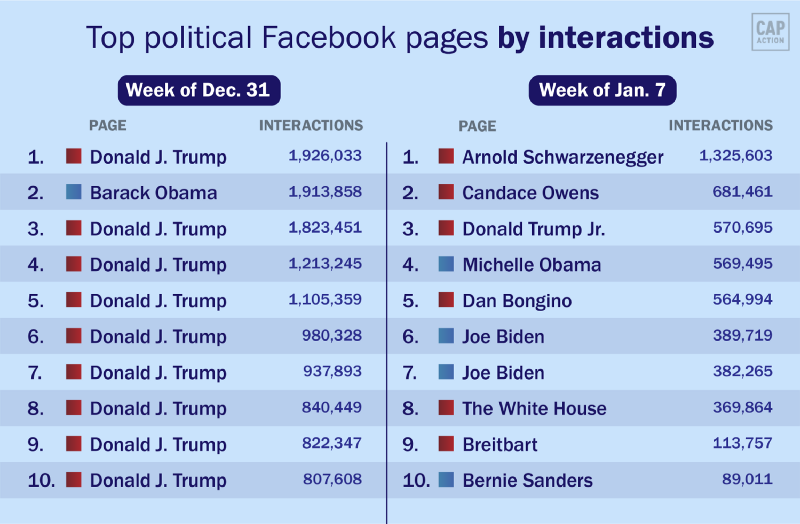 Top 10 best-performing political Facebook posts by interactions according to data from NewsWhip.
Top 10 best-performing political Facebook posts by interactions according to data from NewsWhip.
That said, conservatives still have a significant engagement advantage on the platform overall. That is largely due to the fact that many popular conservatives on Facebook — people like Candace Owens, Donald Trump, Jr., and Dan Bongino — post much of the same sensationalistic, dangerous rhetoric as Trump. And as Facebook itself has admitted, that content tends to perform better in its algorithm.
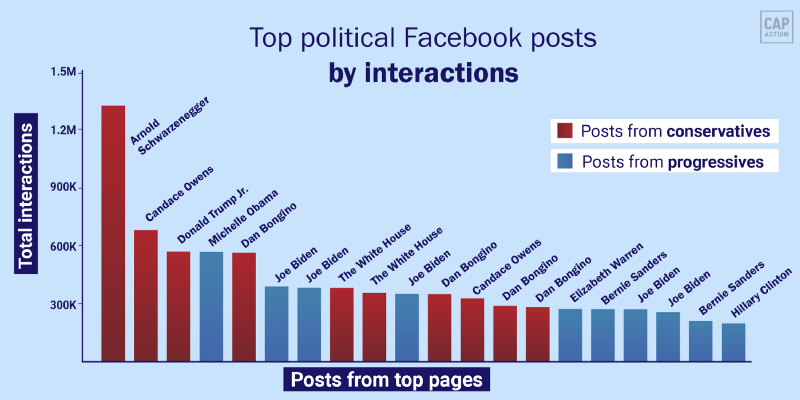 Top 10 best-performing political Facebook posts by interactions from conservative and progressive pages according to data from NewsWhip.
Top 10 best-performing political Facebook posts by interactions from conservative and progressive pages according to data from NewsWhip.
Progressives remain largely focused on addressing last week’s insurrection, encouraging political accountability, and fighting for working families, while conservatives (with the exception of Governor Schwarzenegger’s heart-wrenching video) are mostly focused on making false censorship claims.
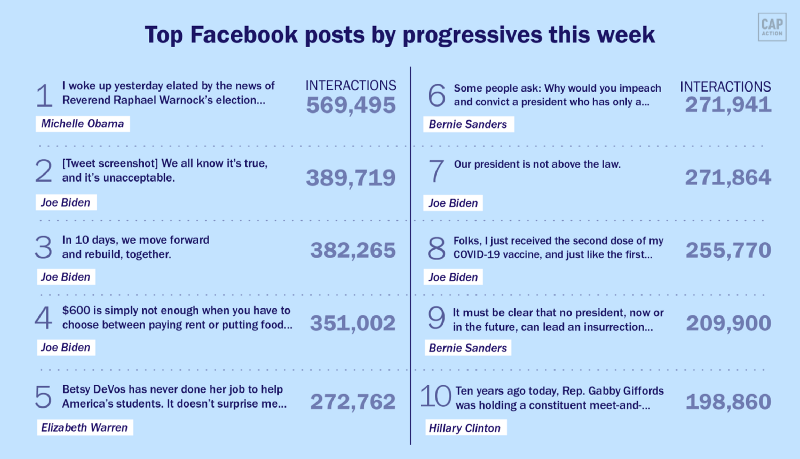 Top ten Facebook posts from progressive pages over the last week, according to data from NewsWhip.
Top ten Facebook posts from progressive pages over the last week, according to data from NewsWhip.
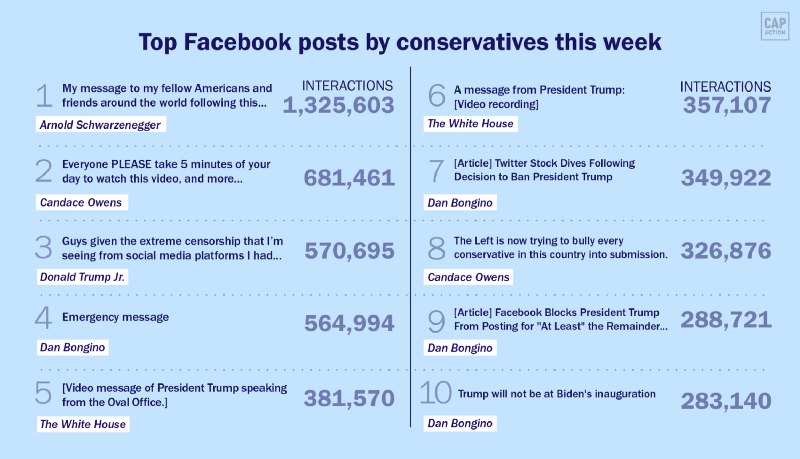 Top ten Facebook posts from conservative pages over the last week, according to data from NewsWhip.
Top ten Facebook posts from conservative pages over the last week, according to data from NewsWhip.
Despite what Sheryl Sandberg may say, there is loads of evidence that Facebook not only encouraged people to post more extreme content in order to gain likes, but also that “64% of all external group joins are due to [their] recommendation tools.”
In a chilling new analysis from the New York Times, Charlie Warzel walks us through several far-right Facebook users’ journeys into radicalization and demonstrates the real-world implications on individual users when a platform rewards inflammatory, conspiracy-filled content.
The bottom line: Facebook has played a leading role in radicalizing a large swath of Americans. Now it must be part of the solution.
ON MY RADAR
- Monday, January 18 is Martin Luther King, Jr. Day, and a national day of service. You can find a remote or safe and socially distanced, in-person volunteer event near you here!
- Friday, January 22 is the 48th anniversary of the landmark Supreme Court decision Roe v. Wade. Learn more about the current state of abortion access and the renewed call for abortion justice from All* Above All (@AllAboveAll) here!
ASK ALEX
This week a reader asks, “Is deplatforming Trump a freedom of speech violation?”
As always, IANAL (I Am Not A Lawyer), but the First Amendment starts with “Congress shall make no law.” This generally means that Congress (and the government) cannot make a law that limits speech. Private entities like Twitter, by contrast, are allowed to set the rules for their spaces as they see fit. Not only is Twitter generally free to moderate its platform as it likes, but the First Amendment prevents the government from interfering. In other words, the President can’t moderate Twitter, but Twitter can certainly moderate the President. Section 230 — the provision in the Communications Decency Act which is oft cited and oft misunderstood — also protects internet companies’ decisions to moderate content as they see fit.
Twitter finally removing President Trump after hundreds of violations is not a frightening turn of free speech, but a perfectly legal action — one that we think was the appropriate, if overdue step in ending his constant abuse of their platform. Looking at the harassment and incitement to violence the President has tweeted over the last four years, the Great Deplatforming is a positive development in that effort — and one clearly protected by the First Amendment.
Stay safe,
Alex
P.S. Please do forward along to your friends who are interested or encourage them to sign up here.
This newsletter is written by me, Alex Witt (@alexandriajwitt), a progressive political strategist and Dolly Parton enthusiast (she/her). I’ve managed social media programs for presidential candidates, political committees, progressive advocacy organizations, and more.